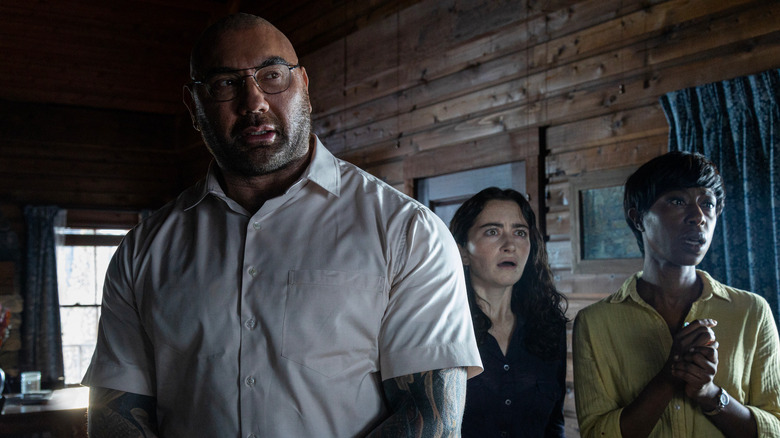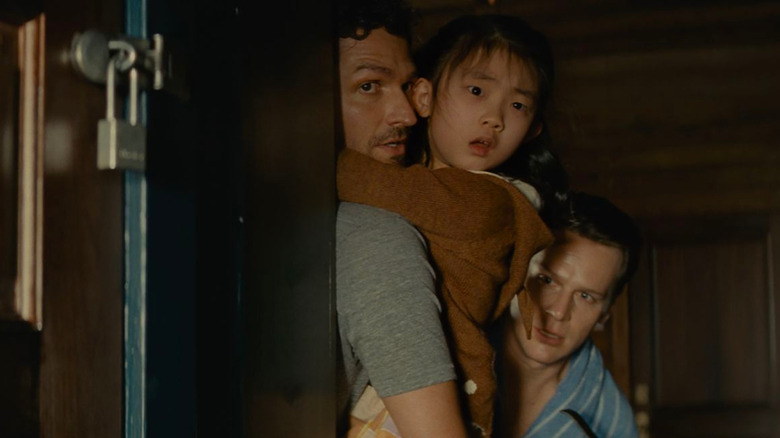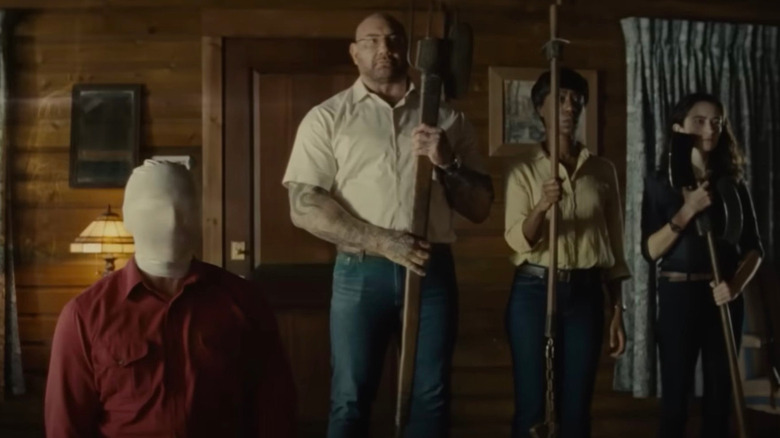Knock At The Cabin Review: M. Night Shyamalan's Disturbing Thriller Is A Return To Form
I never gave up on M. Night Shyamalan. The filmmaker broke out in a huge way with "The Sixth Sense," a ghost story with a whopper of a twist and a film that instantly solidified Shyamalan as an up-and-coming director to watch. Then a curious thing happened. As Shyamalan kept making movies, audience opinion began to shift. People seemingly grew tired of his "What a twist!" endings. And, to be fair, he made some stinkers along the way. But I remained in his corner. I liked too much of what he was doing to fully quit, even when most audiences had long since walked away.
Shyamalan began something of a comeback with "The Visit," his found footage flick that asked, "Aren't old people scary?" Financing his films himself, the director roared back to life, following "The Visit" up with "Split" (good), "Glass" (not very good), and "Old" (weird and kind of goofy but also a lot of fun). Now, with his latest, "Knock at the Cabin," Shyamalan is back to remind us he still has what it takes to deliver the goods.
While I've enjoyed most of his recent output, "Knock at the Cabin" feels like a real return to form for Shyamalan, and closest in tone and camera movement to his earlier, more successful work. While the film's script — adapted from "The Cabin at the End of the World" by Paul G. Tremblay and credited to Shyamalan, Steve Desmond and Michael Sherman — is often only half-baked, asking questions it has no real intention of investigating, the filmmaking is definitively fluent and assured. It's as if Shyamalan is taking every trick in the book he's learned and employing them here with strong results. Shyamalan and cinematographer Jarin Blaschke create shots that have cameras attached to people being pummelled; woods that seem to be breathing and shifting; a series of disturbing images; and a wealth of Jonathan Demme-like close-ups in which characters gaze directly into the camera as if they were addressing the audience. It culminates in Shyamalan's most visually assured film and another reminder that he's still one heck of a filmmaker.
A terrible choice
Somewhere in the woods of Pennsylvania, couple Eric (Jonathan Groff) and Andrew (Ben Aldridge) are vacationing in a remote cabin with their daughter Wen (Kristen Cui). When we first meet Wen, she's out catching grasshoppers. Out of the woods comes a hulking figure — a heavily tattooed man named Leonard, played by Dave Bautista. Bautista has quickly become one of the most interesting wrestlers-turned-actors. He could've easily gone the route of Dwayne "The Rock" Johnson and stuck to cookie-cutter action roles. Instead, Bautista has pushed himself, often playing against type. Here, his massive frame betrays a gentle side — he's almost heartbreakingly kind and sweet when he first meets Wen. But there's a sadness lurking under Leonard's exterior, and as three more people start coming out of the woods holding strange, makeshift weapons, he apologizes to the little girl for what he has to do.
And what he has to do is take Wen's family hostage. Leonard and his three associates (he says they're not friends, more like co-workers) include Nikki Amuka-Bird as Sabrina, a nurse; Abby Quinn as Adriane, a chef; and Rupert Grint as Redmond, who doesn't seem to have a profession other than being angry. Other than Redmond, these kidnappers are almost comically polite. They apologize profusely for taking the family hostage, and Leonard in particular tries to be as nice as possible. But there's a horrifying reason behind this situation: Leonard claims that either Eric, Andrew, or Wen will have to make a "terrible choice" to be sacrificed to save the world from imminent destruction.
Of course, Eric and Andrew don't buy into any of this. They assume they've been kidnapped by lunatics. Andrew, who has had his fair share of run-ins with angry homophobes, goes further and suggests that the family is being targeted because he and Eric are gay. Leonard says that's not the reason at all, but Shyamalan lets the suggestion hang in the air. The script takes things further by having Andrew wonder that even if this entire crazy idea were true, why would he want to save a world full of people who hate him for being who he really is? It's an intriguing question with deeper connotations, but the script rushes by it to get to the more traditional thrills and chills.
Visual intensity
And that's fine. "Knock at the Cabin" is under no obligation to make a statement. But I found myself wishing Shyamalan and company did more than scratch the surface of these ideas. Throughout the entire film, more of these deeper questions arise — is this a story about religion? Faith? Extremism? There's even talk about characters being indoctrinated to violence via hate-filled message boards, but that, too, is something the film quickly moves on from.
As time ticks on at the cabin, Shyamalan stages increasingly alarming, violent moments designed to disturb more than shock. A lot of the violence is shot in such a way that it's carefully off-screen, and yet we feel the brutality of it all. At the same time, the filmmaker is not interested in being ambiguous here. Paul G. Tremblay's book left a lot of things up in the air, but Shyamalan is more concerned with ratcheting up the terror via set pieces. At the same time, the filmmaker also understands exactly how to play things close to the vest here, and there are moments where we think we have a definitive answer only for another character to calmly and logically shoot it down.
Tension is the name of the game, and Shyamalan knows exactly how to build it. It rises and builds to the point of breaking. This might be the filmmaker's most intense film to date, and while there are occasional bursts of genuine humor, "Knock at the Cabin" is more concerned with leaving you perturbed and unsettled by what you're witnessing. On that front, "Knock at the Cabin" is a success, even if its script can't quite match the visual intensity. Whatever is lacking here is balanced by Shyamalan's filmmaking. Say what you will about the director, but he's still got it.
/Film Rating: 7 out of 10


